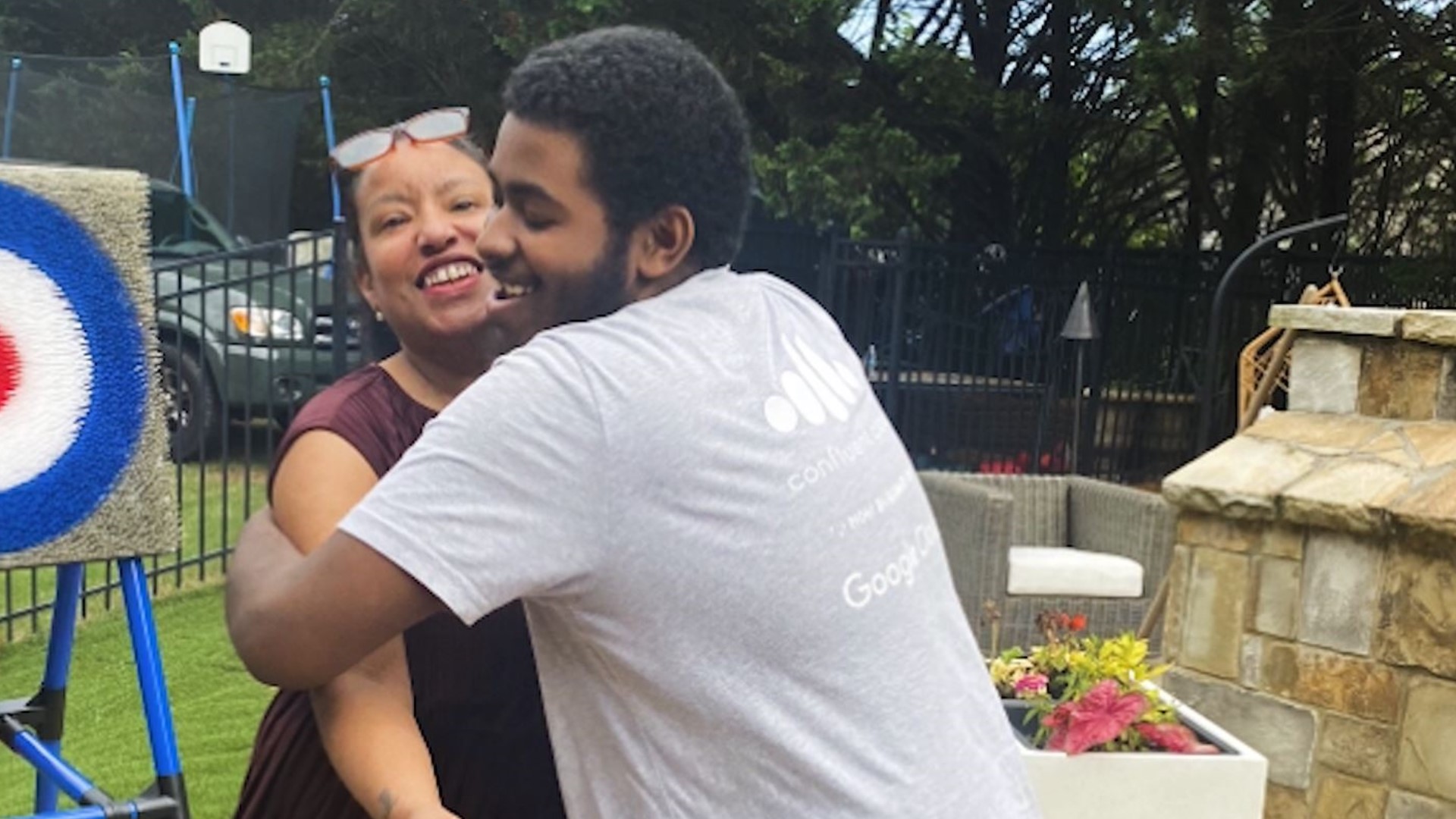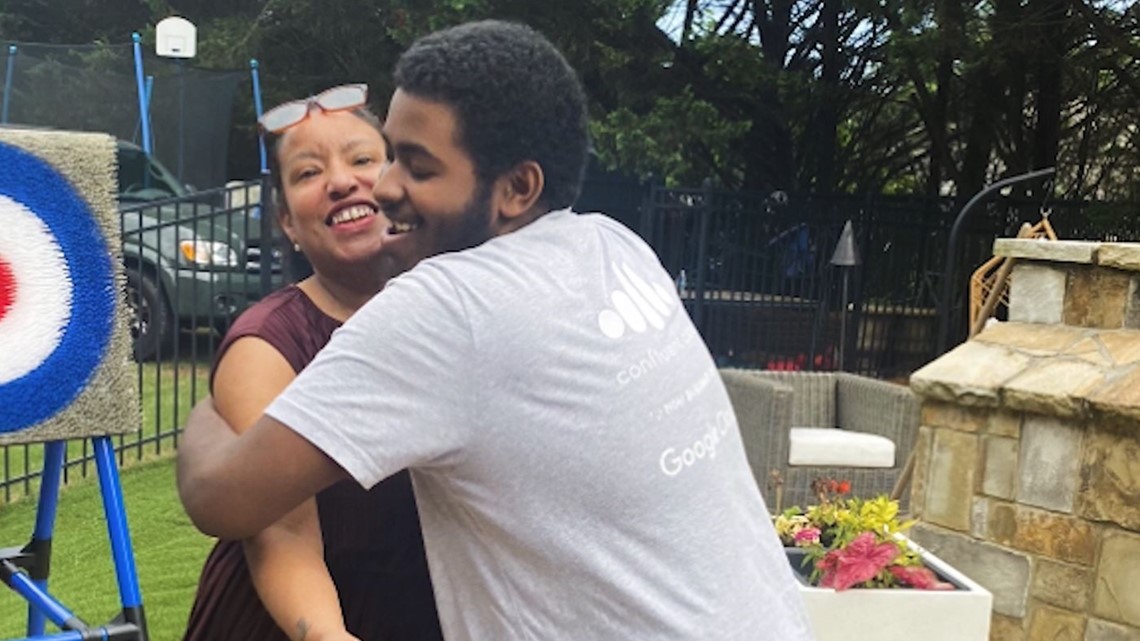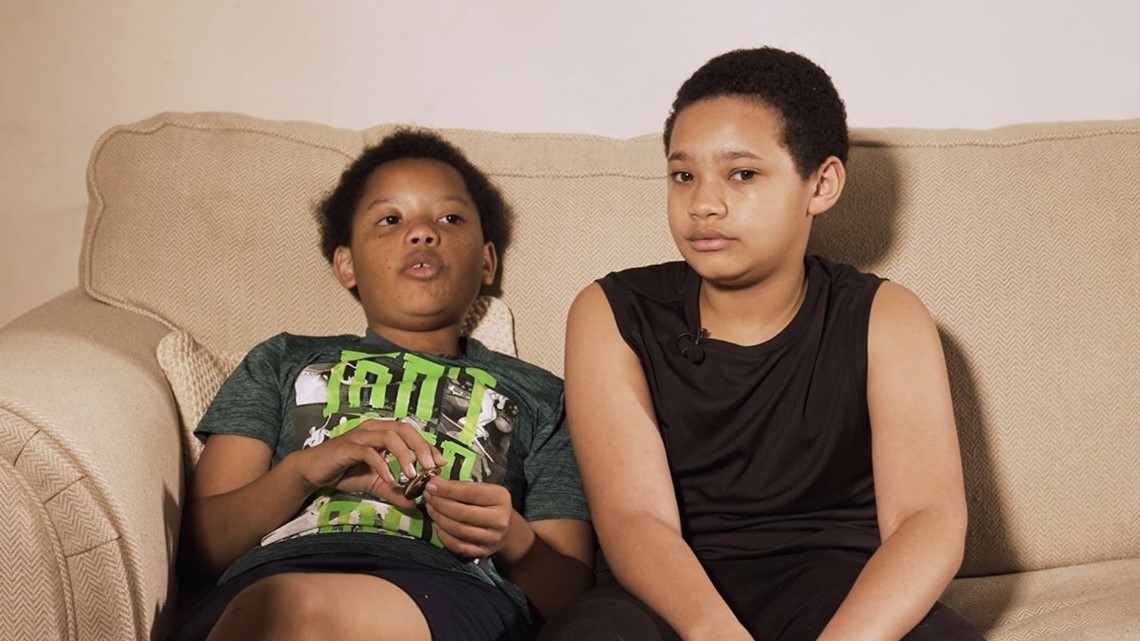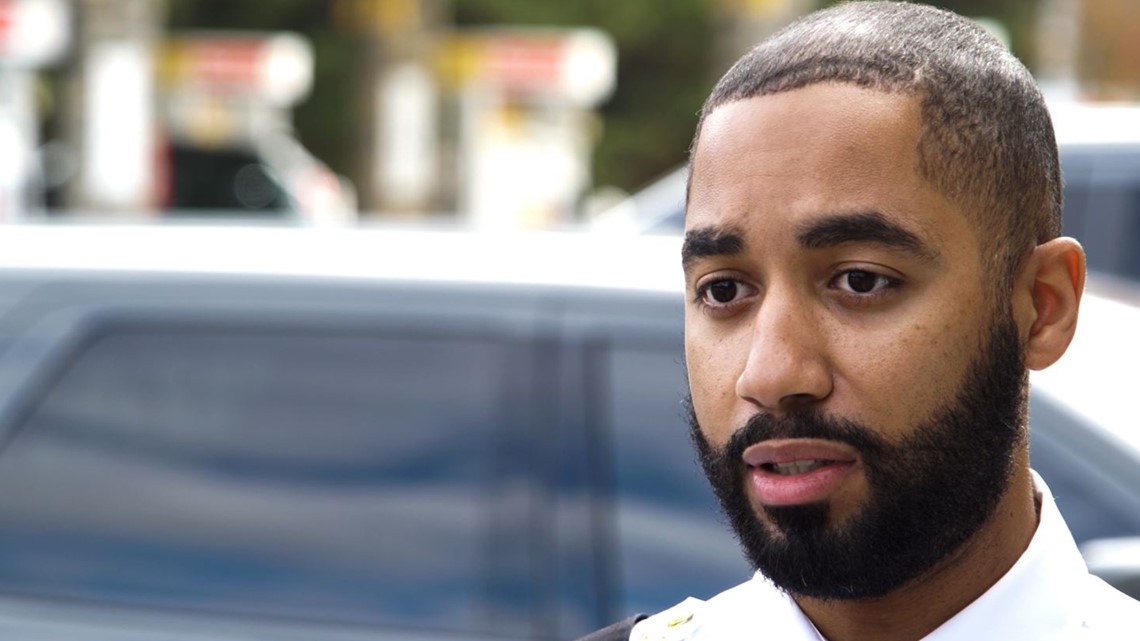Mom refused to pick her son up from the hospital until Georgia found a way to keep her entire family safe. It took 3 months.
Parents have shared the struggle to find services for children with developmental and behavioral needs. Now, law enforcement, state, and siblings share their view.

The state says each day it’s tracking nearly two dozen adults with disabilities that have been abandoned to an emergency room because their parents or guardians feel they can no longer provide them with care.
These people generally do not have long-term physical injuries or conditions requiring hospitalization. But the families 11Alive has talked with say they turned to this as a last resort when in-home supports weren’t enough to meet the daily living needs or keep other members of their family safe.
Taniqua Clarke watched as her son left in an ambulance on September 4, 2023. It would be three months before she would see him again.
AJ is 19, non-verbal, with autism. 11Alive Investigates reviewed police reports, body camera footage, and 911 calls to better understand perspectives on this complex problem.
'We're being abused': A mother's concern
Investigator Rebecca Lindstrom sat down to talk with Clarke just as her two younger sons arrived home from school. Clarke helped them fix a snack, walking past a cupboard with jagged broken glass several times.
Clarke never thought to explain why it was broken until asked. It was a remnant of AJ’s last outburst in the house.
“He went after the kids," she explained. "I finally cornered him (AJ) by the kitchen and blocked him, and I said run, run.”


That’s when Clarke says AJ started screaming, “and he slams his hand into the glass. He had blood running down his elbows. Glass was everywhere.”
It wasn’t the first time AJ had chased the boys or had a violent outburst. A casual glance in any room of their house reveals holes either punched into the wall or created by something like a thrown chair.
The blinds and couch are broken, and the doors and door frames have fallen apart from constantly being opened and slammed shut. Clarke showed a room with six broken TVs and a busted bed frame.
Clarke’s car isn’t immune either. The passenger side door panel is broken, and the windshield has several bursts of cracked glass from fists and feet.
It’s all evidence to her that AJ has become too unpredictable and violent, threatening the safety of her other sons, ages 11 and 12.
“The kids are in fear; every day, they’re in fear,” said Clarke. “We’re being abused. We’re in an abusive home; I know it’s not intentionally. I don’t want to call it that. Imagine you see somebody, a woman being abused, you’re like, 'you need to leave him.' But this is my son though. He’s attacking us literally.”
Clarke says she’s now turning to the state insisting on help, refusing to pick her son up from the hospital. After a few days, the hospital started calling 911 itself, not for violent outbursts, but for help tracking down AJ’s mother.
A caseworker with the Department of Family and Children Services left a series of little yellow sticky notes on her door after being unable to reach her.
“If we don’t hear from you by the end of the day, I’m filing a report with the police for abandonment,” Clarke recalled the note reading.
Clarke hates that word: abandonment.
“Trying to get him services, I don’t feel like that’s abandonment,” she said, defending her actions.
'I love him but': Younger brothers struggle
Clarke’s younger sons recall the night AJ left for the hospital. They were locked in the bathroom, the safest place, they say, in the house. The door is thicker, and the lock works really well.
“It’s hard to open, so we know that it’s perfect to hide,” the youngest said.
“I’m imagining what I think is happening out there,” the oldest adds.
11Alive is not using the boy’s names because of their age. They speak with an innocent candor, a matter-of-fact way of describing events, aware that it is not normal but helpless to change it.


When asked how they would feel if their brother came home, one repeatedly says he would be depressed, sharing nightmares he’d experienced and the worries he has when AJ is around. The younger brother seemed mixed.
“I’m mild about it because I really don’t know. I love him but I just don’t like the fact that he ruined, probably ruined our life, did all this bad stuff,” he explained.
AJ’s brothers said they used to enjoy playing with him, but as he got older his behavior changed. They say he went from being "nice and friendly" to "evil and scary."
“The reason five is my favorite number is because that’s (the age) when nothing bad happened, we had decent money, AJ wasn’t bad, we went on vacations all the time,” said the younger brother.
They reflect on one of AJ’s outbursts, debating whether their mom was shoved, pushed, or pulled. It’s clear from their casual tone that it’s a reflection of behavior that had become routine.
The two then showed a coin they received from an officer responding to one of their mom’s 911 calls. On one side, it reads, "Thanks a million." The other has the police department’s logo.
“I don’t know what this means, but I feel like this is rare for some reason,” he said, flipping the coin in his fingers.
'Helping not hurting' approach: When law enforcement is involved
AJ’s mom, Taniqua Clarke, has called 911 in Roswell a dozen times in just one year.
Roswell Police Department declined to be interviewed about its training or response to calls like Clarke’s, but 11Alive did review the body camera available from those visits.
In those clips officers are seen slowly approaching AJ, calmly trying to talk with him and de-escalate the situation. It’s clear several officers are familiar with the family.
In one response in June, the officer asks Clarke if she’d had any luck finding additional support. Public records show officers tried to help by making referrals to adult protective services and calling EMS when a change in medication might help. Despite their efforts, nothing seemed to change.
“We’re going in a circle. You’re doing the same thing,” said the officer.
While Roswell PD declined to comment, the South Fulton Police Department was proud to talk about its effort.
“We want to take an approach that’s helping and not hurting,” explained Lt. Nicholas Williams with the department’s special services unit.


Williams said the department took a major shift in its training after a call involving a 10-year-old with autism. When officers went on the scene, all they knew was someone was peeking into windows.
“So when they (officers) were speaking with him, he was basically mimicking what they were saying. And the officers thought he was being (a) smart alec. And when he didn’t respond the way they perceived him or wanted him to respond and he took flight, the officers detained him and ended up putting handcuffs on him,” he explained.
He said every one of their officers now takes crisis intervention training and Autism Safety 101, a course on how to identify and relate to someone with autism.
Williams said officers in SFPD sit down to talk with the families, caretakers, or guardians to devise a plan to avoid calls that lead to only two options: the jail or the hospital.
“We create relationships and bonds with them. It’s not just a one-off where we meet each other, and it’s just a hi and bye. We pass out our business cards,” explained Williams.
Many families like Clarke say they rely on police to help de-escalate a crisis because they respond much faster than the state’s mobile crisis response unit.
But Williams cautions police can’t fill the gaps in the health care system.
“If you put all of the burden on police, you’re setting yourself up for failure, and that’s what community policing is all about," he explained. "Not just relying on one source, but many sources to come up with solutions to a problem."
The last resort
“Taking your son or daughter to an emergency room is, is not the way to move a person into services,” said Allen Morgan, who leads the team at the Department of Behavioral Health and Developmental Disabilities, or DBHDD. The team is often called upon when people like AJ are in the ER.
Morgan, who is the Deputy Assistant Commissioner for DBHDD, says a hospital emergency or treatment room meant for medical needs and short-term stays is not an ideal place for someone who actually needs mental health care or supportive housing.
There are safety concerns for hospital staff not trained to work with people who may have aggressive tendencies or special needs. Clarke said she’s received reports that staff have had to restrain her son and give him medication to calm him down.
Most children get services through a federal mandate and funding that goes through the school system. That’s why DBHDD works more with adults who have aged out of that care. Morgan said, ideally, his office would like to know about them before families anticipate they will need services.
Clarke admits she didn’t apply for services until AJ was 17. She thought she had to wait until AJ stopped attending school.
How Georgia's services work
While residents have likely heard about the state’s waiting list for waivers that can help with in-home support or community living arrangements, Morgan said it’s not a first-come-first-serve situation. Instead, the state does an annual needs assessment, which ranks those with the greatest and most immediate needs for care.
“It's not just matching people to open beds. There's no magic facility because we don't do facilities,” Morgan said.
Many people, like AJ, also receive SSI to help cover living expenses but without any independent living skills, he must first have a place to go.
Morgan said when families suddenly leave their adult children at the hospital, it can take months to determine eligibility. State funding is limited, and Georgia’s workforce shortage has reduced options.
“If you have someone whose needs are particularly high, if you have, say, aggressive behavior, and you have medical needs, those settings are not as abundant as we would like,” said Morgan.
A possible solution in the works
The state is building a new crisis stabilization and diagnostic location in Macon that will have staff trained to work with people who have a developmental disability as well as mental health diagnoses. The hope is to have that location operational in 2025.
“We’re adding a multi-specialty outpatient clinic that will help those people who either have received stabilization or are at risk of needing it stay in the community,” explained Morgan.
DBHDD is also preparing two transitional group homes in Augusta designed to help those who might otherwise end up trapped in the ER.
“They will have specific resources, including nursing and behavior supports and staffing, to try to help people transition from hospital settings back into the community,” he explained.
It’s a pilot project that will open its doors in early 2024. Two homes that can assist four people in each. It’s not housing; it’s a transitional program to help get the skills and support they need to successfully and safely live in their community.
Clarke says the help can’t come soon enough.
“I miss him so much, you have no idea. It’s really been hard,” she admits with a heavy sigh, sharing some of her happier memories with AJ.
Clarke says AJ loves hugs, laughs and claps his hands a lot.
“He loves to watch his music videos over, and over, and over - on full blast!” she explained.
She tried to get him behavioral therapy last year so he could learn new ways to manage or communicate his frustration. AJ is still on that waiting list for services.
“There have been a couple of times when the Wi-Fi went out. Oh, my goodness! I had to call police twice that night,” she explained. Another night he threw his phone, then got mad at her because it was broken.
That’s why as much as her heart breaks, she said she’s not picking AJ up until she can get the help her family need to keep everyone safe.
“He’s there in the hospital and I check on him every day, I check the notes. It’s the only way I can feel like I’m seeing him,” she said.
Even in their youth, her sons seem to understand their mom’s emotions around this complex situation.
“If I was a father I’d probably miss my own son,” one says. “I’d be really glad that he was gone and I get a break, but as a father or mother I’d still be pretty sad.”
The other brother chimes in.
“He’s dangerous, but you love him ‘cuz you get that you can’t help him.”
Investigator Rebecca Lindstrom has been looking into child abandonment in the state and why parents may make this tough choice. Follow her reporting at 11alive.com/keeping.
Have a tip for 11Alive Investigators? Text "investigate" to 404-885-7600 or email us at investigates@11alive.com. Your story and information are important to us, we'll make sure it gets to the right person on the team who may be in touch.
